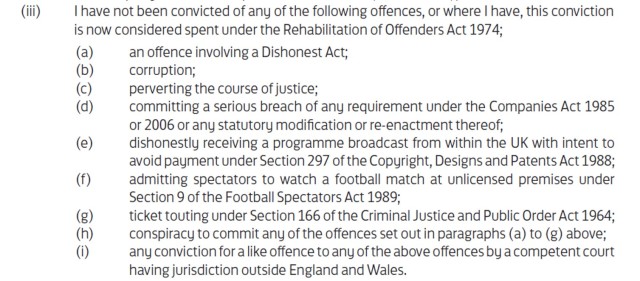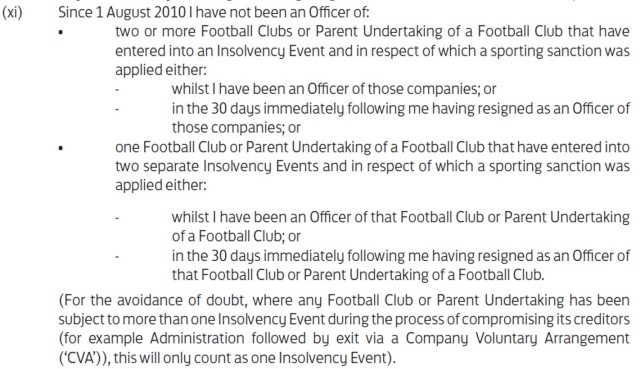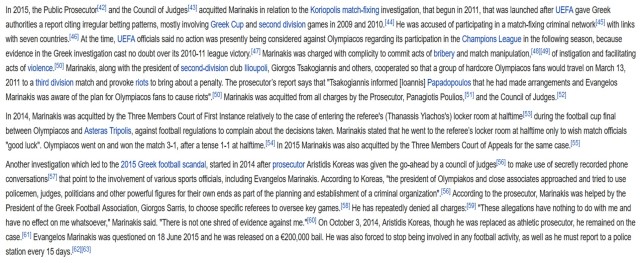We’re all furious about the Owners and Directors Test (ODT) these days, aren’t we? We know that it’s deeply flawed and hopelessly ill-equipped to prevent wrong-uns from buying clubs. But, have you actually read the ODT? Do you know what’s in it and, crucially, what should be in it? I had a read to check …
First up, I promise you this is going to be brief and simple. Just like the test itself, in fact. It’s a document that can be read, including all the qualifying notes, and completed in less than five minutes.*** It’s only slightly more complicated than an aeroplane landing card and it requires no legal knowledge.
Test one: Who are you?
The prospective owner is not being asked a deep philosophical question, here.

In fact, they’re not even being asked for some information – like a National Insurance or passport number – that might involve them having to get up from their gold leaf desks. The biggest challenge they face here, in all likelihood, is remembering the name of the club they want to buy. Presumably their lawyers can help with this.

Test Two: How many football clubs do you own?
Again, a pretty softball question this, but a very useful aide–mémoire for someone like Roland Duchâtelet who might not be immediately sure if it’s five or six clubs he’s attempting to ruin concurrently.

Test three: Finally, are you a wrong-un?
Finally? Yes, that’s right, we’re onto the last question already. If you have successfully been able to say who you are, what club you want to buy and whether you own any other clubs, then you’re on the home straight. The final challenge, like a dumbed-down Krypton Factor assault course, is to read a long list of bad things and then sign your name to confirm you haven’t done them.
It can look a little off-putting at first, but the list isn’t that complicated. Here, translated as best as I can into plain English, is what you need to be willing to claim.
“I don’t secretly run any other clubs.” 
“I am not so utterly incompetent or criminal that I am barred from being a director of a UK company.”

“I have not recently been convicted here or abroad of any of the following criminal offenses: dishonesty, corruption, perverting the course of justice, running a company criminally badly, streaming football on the internet, showing the football in a pub without a Sky subscription, punting on a few spare tickets, planning on doing any of the above.”

“The cops aren’t currently trying to pin any of those crimes on me, either.”

“I am not a rapist or paedophile.”

“I am not a football hooligan.”

“I live up to football’s high standards on bribery and gambling.”

“However badly I may behave, it is never so bad that world sport is unable to ignore it.”

“I am not currently bankrupt.”

“I have no professional qualifications or, if I do, I have yet to be struck off.”

“I have never run a football club in England or Wales so badly that it has been expelled from the league.”*****

“I haven’t bankrupted two clubs (or the same club twice) in the last six-and-a-half years.”

Congratulations, you are now qualified to run a football club! I’m not joking, that really is it; you’ve completed the Owners and Directors Test.
The ODT is far more useless than you thought
So, what have we learned?
Well, first off, it’s entirely self-certified. You do not have to have a clean record, you merely need to be willing to claim you do. Now, obviously, if you have lied, there’s a decent chance you may get caught out. But those administering the test on the FA’s behalf – the EFL or the Premier League – are not obliged to actively investigate your bid and dig for evidence of your unsuitability. All they have to do is see that you have filed the appropriate paperwork.
The test is extremely weak. You may have heard people claim that, “Even a criminal can own a football club.” Well, it’s true. The ODT applies to a very narrow range of criminal offences as well as to things we might describe as professional malpractice and ‘crimes against football’. And, even then, it only disqualifies people who are prepared to admit that they did these things and were caught, found guilty and punished to a certain level. Not every bad barrister is caught, let alone disbarred from the bar and not every innumerate accountant cooks the books and then has them thrown at him.
I spoke to the FA’s Financial Regulation Department and they confirmed that any criminal conviction outside those specified would not necessarily be a reason to fail the test. While the FA says it reserves the right to look at each application on a case-by-case basis, prima facie it is literally the case that there is nothing in the ODT to prevent a convicted murderer running your football club.
The real problem with the test, however, isn’t just how little we demand of prospective owners, but how we assess compliance. By using other bodies’ tests, usually legal or quasi-legal third parties, it absolves the FA, EFL and Premier League of responsibility for making any judgements about people’s fitness to own and run a football club. This is an entirely negative – and negligent – form of regulation; you pass if you haven’t done something. The test never seeks evidence of ability, knowledge, experience, temperament and ethos. In fact, if you’ve ever interviewed someone for a job, you’ve likely investigated their fitness to jockey a desk in far more detail than the EFL has ever explored someone’s fitness to run a football club. A relatively junior office job may demand two or three interviews. Running a football club with roots in a community that may go back over 100 years? A form about a tenth as testing as renewing your car insurance. Which is why we have had absurd spectacles like Massimo Cellino repeatedly ‘failing’ and then ‘passing’ the ODT as various legal proceeding and appeals played out in his home country. One day he wasn’t allowed to run a club, the next all was fine. One thing remained unchanged throughout, though: his utterly terrible stewardship of Leeds.
As the EFL itself admits, “The Test governs the eligibility of who is able to own a club – it does not also ensure that those individuals have the capability to manage it properly.”
And, if that sounds reasonable, consider Evangelos Marinakis, the prospective owner of Nottingham Forest. Last year Private Eye published a piece cataloguing some of the legal challenges facing him at home in Greece. These included a 173-page report from public prosecutors alleging he was “running a criminal organisation” involved in blackmail and fraud.

NB: If you don’t subscribe to Private Eye, your priorities are all wrong and your life is a shambles. Subscribe now.
Now, the line from his supporters, including a number of Forest fans desperate to get rid of their current unsuitable owner, is that he has never been convicted of anything and, indeed, that the allegations levelled against him were a put-up job by his enemies. Even if this is true – which it may well be – that doesn’t suddenly make everything alright. It doesn’t show he is a suitable custodian of one of England’s great clubs. If an ODT is to have any meaningful impact on football governance, football’s authorities must go beyond legally established facts. They must move into the messy, disputable territory of investigating owners and forming conclusions. Courage, brains and judgement will be required.
Because it seems to me that, if someone keeps getting caught up in the type of investigations that Marinakis does, then we should ask ourselves if this should disqualify him or her from running a football club in England. It is not a criminal trial; we don’t need to be sure so that we are certain. We simply have to say, is this person’s record spotless or near as dammit? And, if it’s not, does it give us cause to worry? It certainly does me. Evangelos Marinakis’ history of acquittals is as impressive as the long list of things he’s been charged with. Here, courtesy of Wikipedia, are the highlights.

What’s the best spin we can put on this? That he’s just a poor guy who just keeps finding himself in the wrong place at the whole time? That, despite being utterly impeachable, he’s acquired enough enemies that they continually attempt to frame him for things of which he’s utterly innocent. Sure, that’s possible.*******
But the ODT won’t engage in this debate at all. No convictions, no problem. According to the Telegraph, “the Football League is satisfied that he will pass the Owners And Directors Test.” And why wouldn’t they be? Francesco Becchetti, Massimo Cellino, Roland Duchâtelet and every other rogue owner you know has passed.
So, there we have it. The Owners and Directors Test is the scandal you thought it was. It is a small document shot through with huge loopholes – as close to useless as it’s possible to be. More than that, though, I think it’s actively damaging to football.
The very fact that a document called the Owners and Directors Test exists, even one that the EFL periodically admits is useless when it’s trying to shirk blame, gives fans false confidence. It gives the unfounded impression that, even if inadequately, someone is guarding the hen house.
But no one is.
The ODT is a total sham. It is not a test at all, but rather a registration form. Nothing more, nothing less.
It provides your club with a level of protection that’s close to zero, while making you believe you aren’t totally defenceless.
For the sake of football, this has to change…
Martin Calladine
If you enjoyed this, please buy my book “The Ugly Game: How Football Lost Its Magic And What It Could Learn From The NFL”. That way I’ll have the money to write more things you might like. Oh, and please spread the word, too. Thanks a lot.
*** I’ve received a few comments to the effect of, “Is that really the test? It can’t be that weak, can it?” I can assure you it is. However, you don’t have to take my word for it. You can download the form by scrolling to the bottom of this page on the FA website. Feel free to fill it in and return it to the FA with your views on what the test is worth. Just make sure you don’t fill it in correctly and end up accidentally running a football club into the ground.
***** ‘Expelled’ is the final doomsday option for serious club misconduct, usually invoked when clubs are in financial disarray and may not be able to fulfil their fixtures. From what I can tell, Chester City were the last club expelled from the league. Looking back, though, there seem to have been other, more interesting expulsions. Leeds City, for example, which was dissolved due to financial irregularities in 1919, were alleged to have illegally paid players in war-time and then tried to stonewall the FA. Their place in the league was taken by then non-league Port Vale, who were themselves expelled in 1968 for financial irregularities of their own. The fact that discussing this section of the ODT rapidly becomes a history less tells us that – like so many other ODT clauses – it sounds tough but has almost no practical value. Clubs are expelled from the league so infrequently that this part of the ODT covers so few people that, if gathered together, they could barely put out a five-a-side team.
******* Ironically, in March 2018, it was reported that Evangelos Marinakis had been charged with drug trafficking in connection with 2.1 tonnes of heroin. True to form, he claimed that, “The prosecution against me is a product of a plot and it has nothing to do with the truth.” Poor old Evangelos, the unluckiest innocent man alive.
Oyston still owns Blackpool FC.Still regarded as fit and proper.Please refer to AVFTT.com and the recent meeting BST and EFL